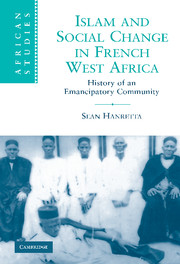Book contents
- Frontmatter
- Contents
- List of maps and figures
- Acknowledgments
- Note on orthographic conventions
- Abbreviations used in references
- Introduction
- Part One “The Suffering of Our Father”: Story and Context
- 1 Sufism and Status in the Western Sudan
- 2 Making a Revival: Yacouba Sylla and His Followers
- 3 Making a Community: The “Yacoubists” from 1930 to 2001
- Part Two “I Will Prove to You That What I Say Is True”: Knowledge and Colonial Rule
- Part Three “What Did He Give You?”: Interpretation
- Conclusions
- Glossary
- Note on References
- Index
- Books in This Series
1 - Sufism and Status in the Western Sudan
Published online by Cambridge University Press: 15 December 2009
- Frontmatter
- Contents
- List of maps and figures
- Acknowledgments
- Note on orthographic conventions
- Abbreviations used in references
- Introduction
- Part One “The Suffering of Our Father”: Story and Context
- 1 Sufism and Status in the Western Sudan
- 2 Making a Revival: Yacouba Sylla and His Followers
- 3 Making a Community: The “Yacoubists” from 1930 to 2001
- Part Two “I Will Prove to You That What I Say Is True”: Knowledge and Colonial Rule
- Part Three “What Did He Give You?”: Interpretation
- Conclusions
- Glossary
- Note on References
- Index
- Books in This Series
Summary
this chapter is unavoidably teleological. its premise is that it is possible to explain the actions of Yacouba Sylla, his followers, and his opponents by contextualizing them within long-term intellectual and social trajectories that were both specific to the Western Sudan and part of a broader Islamic “tradition.” The explanatory success of this contextualization does not demonstrate that such a tradition existed as an autonomous force that could channel behavior and representations in predetermined directions. Rather, it suggests that Yacouba Sylla and his followers drew on patterns they saw in the past as if they constituted a coherent repertoire of creative solutions to problems and precedents to legitimate certain courses of action. Socially composed and situationally invoked in practice, these patterns are here presented synthetically to make them analytically meaningful.
This “Western Sudanic” tradition, which incorporated elements of the regional past as far back as the twelfth century and as recent as the 1920s, had four basic features. First, Muslim religious specialists organized themselves into a self-consciously distinct “Islamic sphere,” characterized by hierarchical relationships between teachers and disciples, constituted by the circulation of and commentary on knowledge pertaining to moral, ethical, and cosmological principles, and reproduced through the transmission of this knowledge in transformative, initiatic stages. Second, these religious institutions were imbedded in a set of notional hierarchies, including the subordination of slave labor and the exclusion of artisans from political authority, with knowledge playing an important role in the legitimation and maintenance of these social distinctions.
- Type
- Chapter
- Information
- Islam and Social Change in French West AfricaHistory of an Emancipatory Community, pp. 29 - 59Publisher: Cambridge University PressPrint publication year: 2009



